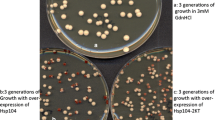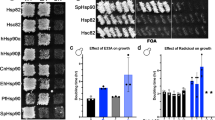Abstract
The presence of millimolar concentrations of guanidine hydrochloride (Gdn-HCl) in growth media causes efficient loss of the normally stable [PSI +] element from yeast cells. Although it has become common practice to include 5 mm Gdn-HCl in growth media to cure [PSI +] and other prions of yeast, the biochemical mechanism by which it cures is unknown. We find that 5 mm Gdn-HCl significantly reduces Hsp104-mediated basal and acquired thermotolerance. Gdn-HCl also reduced the ability of Hsp104 to restore activity of thermally denatured luciferase in vivo. The abundance of Hsp104 was not reduced in cells grown in the presence of Gdn-HCl, ruling out negative effects on expression or stability of Hsp104. We therefore conclude that Gdn-HCl inhibits Hsp104 activity in vivo. Since replication of yeast prions is dependent on Hsp104, our results suggest that Gdn-HCl cures prions by inhibiting Hsp104 activity.
Similar content being viewed by others
Author information
Authors and Affiliations
Additional information
Received: 22 September 2000 / Accepted: 28 November 2000
Rights and permissions
About this article
Cite this article
Jung, G., Masison, D. Guanidine Hydrochloride Inhibits Hsp104 Activity In Vivo: A Possible Explanation for Its Effect in Curing Yeast Prions. Curr Microbiol 43, 7–10 (2001). https://doi.org/10.1007/s002840010251
Issue Date:
DOI: https://doi.org/10.1007/s002840010251




